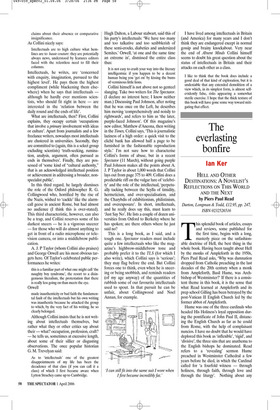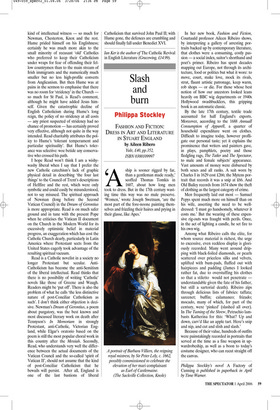The everlasting bonfire
Ian Ker
HELL AND OTHER DESTINATIONS: A NOVELIST’S REFLECTIONS ON THIS WORLD AND THE NEXT by Piers Paul Read Darton, Longman & Todd, £12.95, pp. 247, ISBN 0232526516 This splendid book of articles, essays and reviews, some published for the first time, begins with a long, masterly piece on the unfashionable doctrine of Hell, the best thing in the whole book. Having been taught about Hell by the monks of Ampleforth in the 1950s, Piers Paul Read asks, ‘Why was damnation dropped from Catholic preaching in the last decades of the 20th century when a monk from Ampleforth, Basil Hume, was Archbishop of Westminster?’ If there is a consistent theme in this book, it is the sense that what Read learned at Ampleforth and its prep school Gilling has been betrayed by the post-Vatican II English Church led by the former abbot of Ampleforth.
Hume was one of the three cardinals who headed His Holiness’s loyal opposition during the pontificate of John Paul II, distancing the English Church as far as he could from Rome, with the help of complaisant nuncios. I have no doubt that he would have deplored this book as ‘inflexible’, ‘rigid’, and ‘divisive’, the three sins that are anathema to the English bishops he dominated. Read refers to a ‘revealing’ sermon Hume preached in Westminster Cathedral a few years before he died, in which the Cardinal called for ‘a fourfold witness — through holiness, through faith, through love and through the liturgy’. Nothing about any kind of intellectual witness — so much for Newman, Chesterton, Knox and the rest. Hume prided himself on his Englishness; certainly he was much more akin to the small minority of recusant ‘old’ Catholics who preferred to keep their Catholicism under wraps for fear of offending their fellow countrymen than to the main stream of Irish immigrants and the numerically much smaller but no less high-profile converts from Anglicanism. But then Hume was at pains in the sermon to emphasise that there was no room for ‘stridency’ in the Church so much for St Paul, is Read’s comment, although he might have added Jesus himself. Given the catastrophic decline of English Catholicism during Hume’s long reign, the policy of no stridency at all costs — any priest suspected of stridency had no chance of promotion — has certainly proved very effective, although not quite in the way intended. Read charitably attributes the policy to Hume’s ‘tolerant temperament and particular spirituality’. But Hume’s tolerance was selective: woe betide any conservative who crossed his path.
I hope Read won’t think I am a wishywashy liberal when I say that I prefer the new Catholic catechism’s lack of graphic physical detail in describing ‘the four last things’ to the Council of Trent’s descriptions of Hellfire and the rest, which were only symbolic and could easily be misunderstood, not to say misused. The spiritual approach of Newman (long before the Second Vatican Council) in the Dream of Gerontius is more appropriate. Read is on much safer ground and in tune with the present Pope when he criticises the Vatican II document on the Church in the Modern World for its excessively optimistic belief in material progress, an exaggeration which has cost the Catholic Church dearly, particularly in Latin America where Protestant sects from the United States eagerly took advantage of the resulting spiritual vacuum.
Read is a Catholic novelist in a society no longer Protestant but secular. AntiCatholicism has become the anti-Semitism of the liberal intellectual. Read thinks that there is no possibility of writing ‘Catholic’ novels like those of Greene and Waugh. Readers might be ‘put off’. There is also the problem of what he calls ‘the less distinctive nature of post-Conciliar Catholicism as such’. I don’t think either objection is decisive. Newman’s Dream of Gerontius, a poem about purgatory, was the best known and most discussed literary work on death after Tennyson’s In Memoriam in strongly Protestant, anti-Catholic, Victorian England, while Elgar’s oratorio based on the poem is still the most popular choral work in this country after the Messiah. Secondly, Read, who understands very well the difference between the actual documents of the Vatican Council and the so-called ‘spirit of Vatican II’, should not assume that the kind of post-Conciliar Catholicism that he bewails will persist. After all, England is one of the last bastions of liberal Catholicism that survived John Paul II; with Hume gone, the defences are crumbling and should finally fall under Benedict XVI.



























































































 Previous page
Previous page